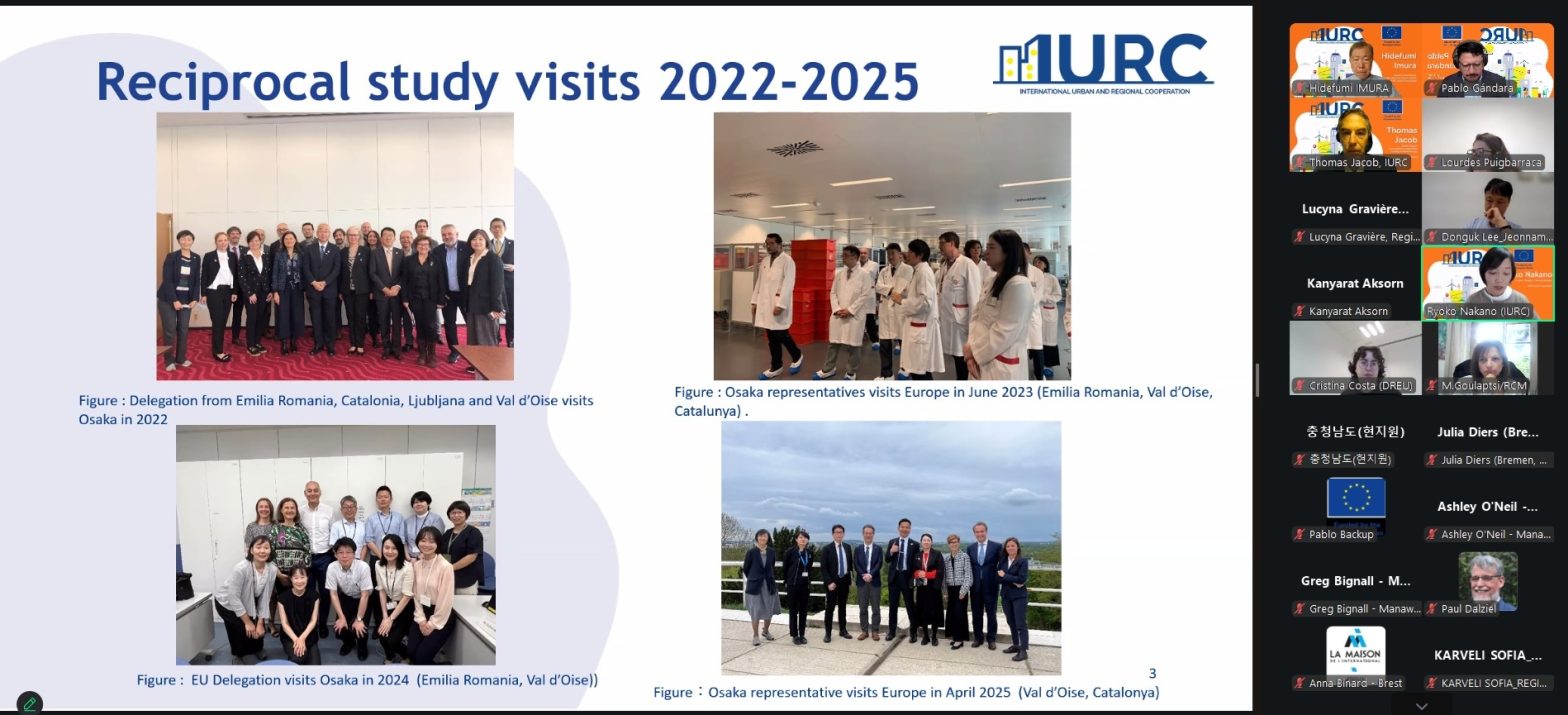1 October 2025 – Online session
The International Urban and Regional Cooperation (IURC) Asia & Australasia Thematic Network hosted its third Region-to-Region Cooperation on Innovation webinar on Clean Energy and Blue Economy, bringing together 44 representatives from regional governments, research institutions, and development agencies across Europe and Asia.
The event highlighted the growing momentum for cross-continental collaboration on hydrogen technology, renewable energy, industrial modernisation, and just transition strategies—key components of IURC’s mission to promote sustainable regional development through innovation and partnership.
Setting the Scene: Shared Agendas for Innovation
Pablo Gándara, IURC Team Leader, opened the session by welcoming participants and introducing the agenda, which included presentations from Japan, Korea, France, and Spain. He noted that the IURC’s regional cooperation model is now entering a new phase of operational alignment, where thematic clusters—such as Clean Energy, Blue Economy, Industrial Modernisation, and Agri-business—are linked with concrete pilot project development.
Gándara emphasised that the meeting series aims to “identify strategic synergies between regions and support them in designing flagship projects and implementation plans by early 2026,” ensuring that IURC2’s partnerships yield measurable results.
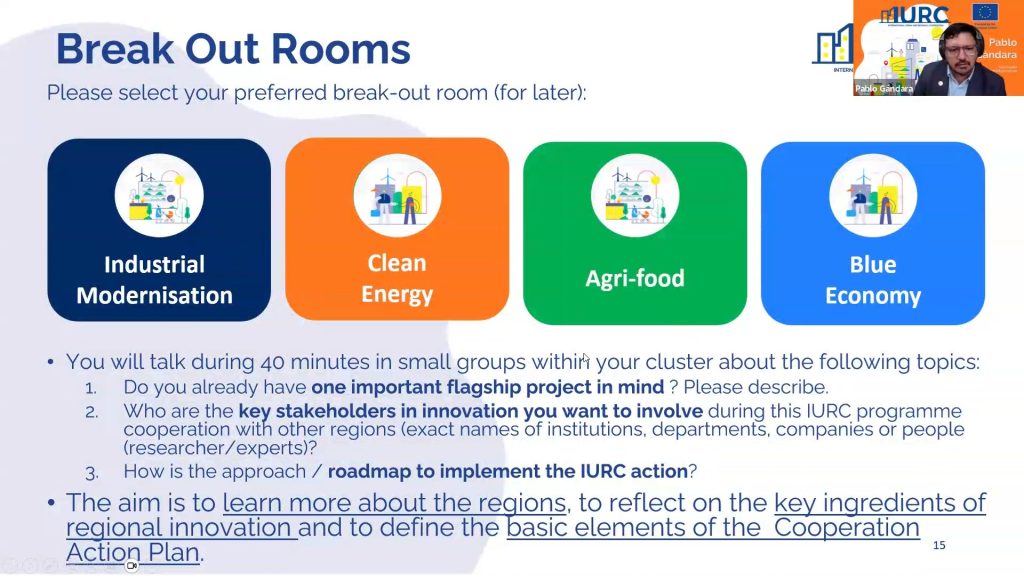
Japan: Driving Hydrogen Innovation
Professor Hidefumi Imura (IURC Japan Country Coordinator) presented Fukuoka Prefecture’s leadership in green hydrogen and clean energy, describing it as a cornerstone of Japan’s regional innovation agenda. He outlined Fukuoka’s commitment to international collaboration, noting that hydrogen production, storage, and distribution are areas where European partnerships could play a transformative role.
Responding to questions from Mr. Gándara, Professor Imura underlined that green hydrogen and international cooperation remain Fukuoka’s top priorities, and that the prefecture seeks to build bridges between research institutions and industry in both Japan and Europe.
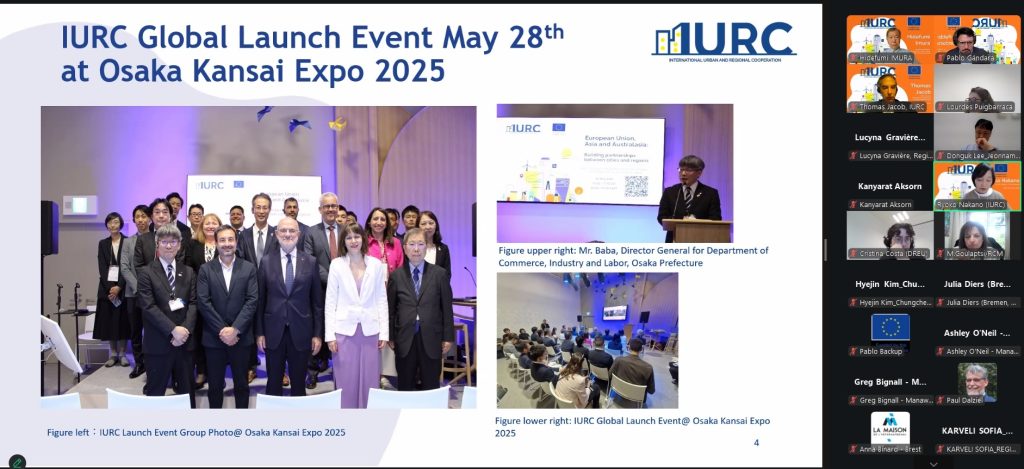
Osaka: Integrating Innovation, AI, and Clean Energy
Ryoko Nakano (IURC Japan Team) followed with a presentation on Osaka Prefecture, detailing its position as Japan’s second-largest economic hub and its ambitious strategy for fostering clean energy, life sciences, and artificial intelligence.
She highlighted Osaka’s preparations for the Osaka–Kansai Expo 2025, organised under the theme “Designing Future Society for Our Lives”, which promotes innovation as a tool for sustainable transformation. The prefecture is also working with European partners—including Catalonia (Spain) and Emilia Romagna (Italy)—on joint initiatives supporting green industry transformation and digital innovation.
Mr. Gándara acknowledged Osaka’s crucial role within IURC’s ecosystem, praising its consistent engagement in building transnational cooperation with European regions.
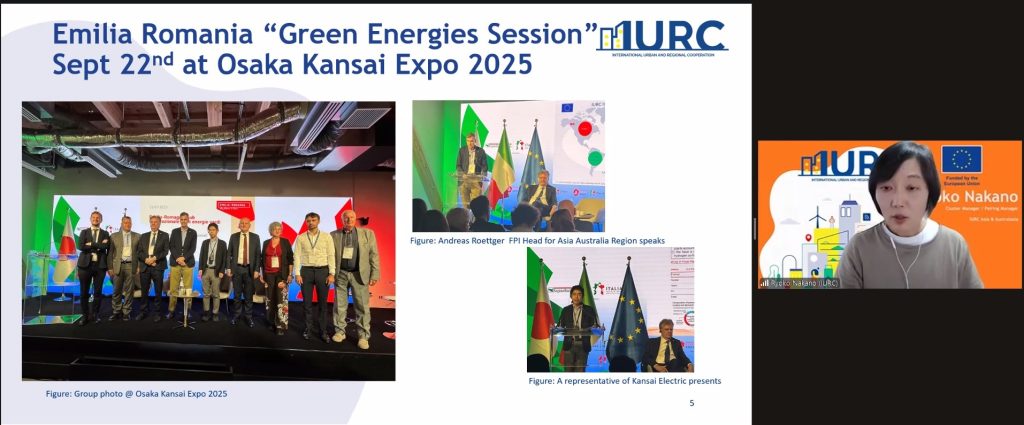
Korea: Transitioning Towards Carbon Neutrality
Hyejin Kim, representing Chungcheongnam-do Province (Republic of Korea), shared her region’s progress toward achieving carbon neutrality by 2045—five years ahead of Korea’s national target.
The province’s strategy is based on three key principles: cooperation, transition, and innovation. It has led Korea’s early coal power phase-out, repurposed idle industrial land for renewable energy facilities, and promoted community engagement to ensure that the energy transition remains socially inclusive.
Kim discussed challenges such as shifting public perception, supporting affected workers, and developing alternative industries for long-term resilience. Through the IURC platform, Chungnam aims to exchange policy models and attract partnerships that reinforce its just transition framework.
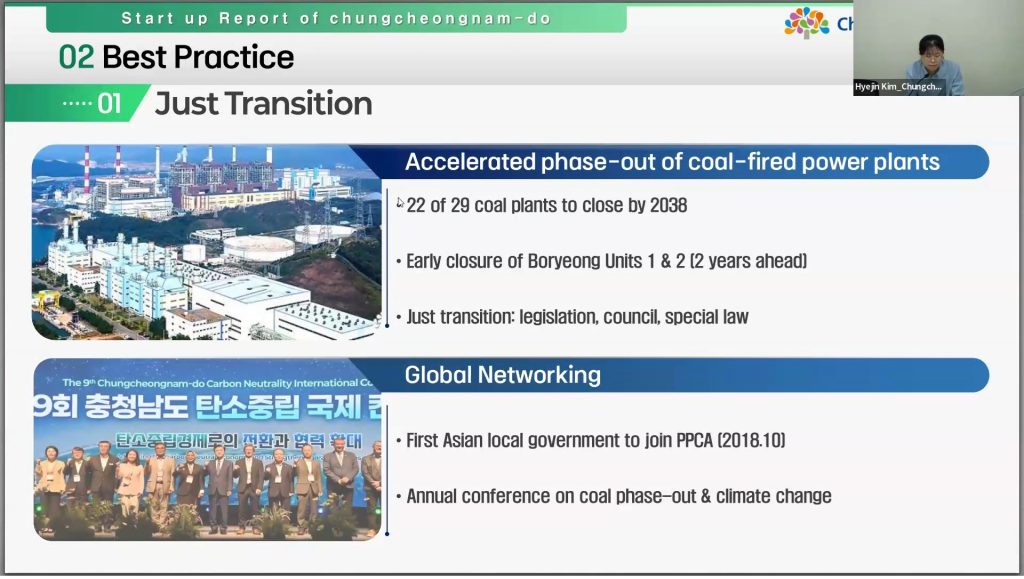
Europe: Building Human-Centric Industrial Transformation
Two European regions—Auvergne-Rhône-Alpes (France) and Catalonia (Spain)—offered perspectives on industrial modernisation and innovation-driven growth.
Auvergne-Rhône-Alpes: From Industry 4.0 to Industry 5.0
Lucyna Gravière presented Auvergne-Rhône-Alpes’ roadmap for green and digital transformation, describing it as an evolution from Industry 4.0 to Industry 5.0—where technology serves human well-being and sustainability.
The region is a leader in hydrogen mobility, microelectronics, and AI applications. Gravière showcased pilot projects moving beyond passenger vehicles toward hydrogen-powered trucks, buses, and trains, and emphasised the region’s interest in sharing its expertise with Asian partners. She also highlighted the region’s role in earlier EU–Japan cooperation frameworks, reaffirming its commitment to long-term partnerships.
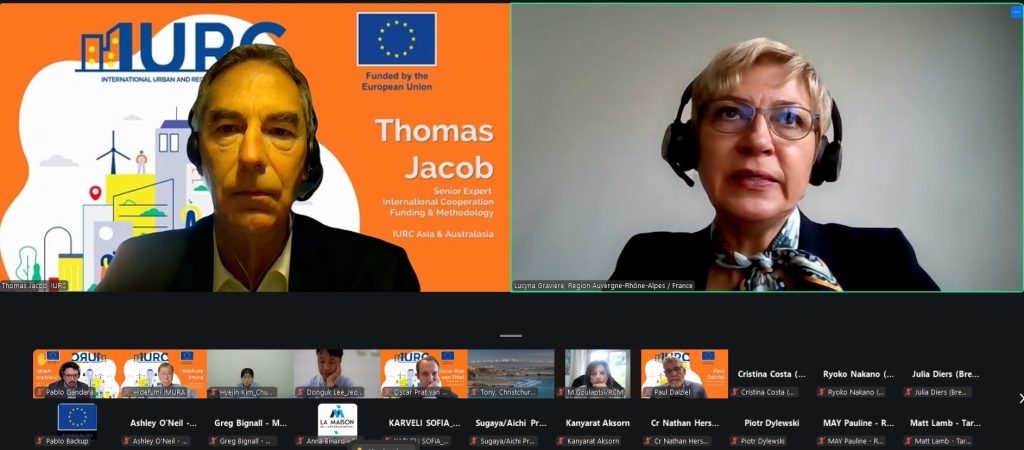
Catalonia: Innovation for Energy and Industrial Transition
Catalonia, as presented by Lourdes Puigbarraca, outlined its active participation in the IURC programme, highlighting its strong industrial base, research ecosystem, and green transition strategies. The region’s representatives stressed collaboration opportunities in renewable energy, agro-food innovation, and sustainability, underscoring the government’s plan to involve multiple departments and stakeholders.
Thomas Jacob, who moderated the session’s discussion, called on regions to “focus on practical, result-oriented projects that can serve as models for future cooperation.”
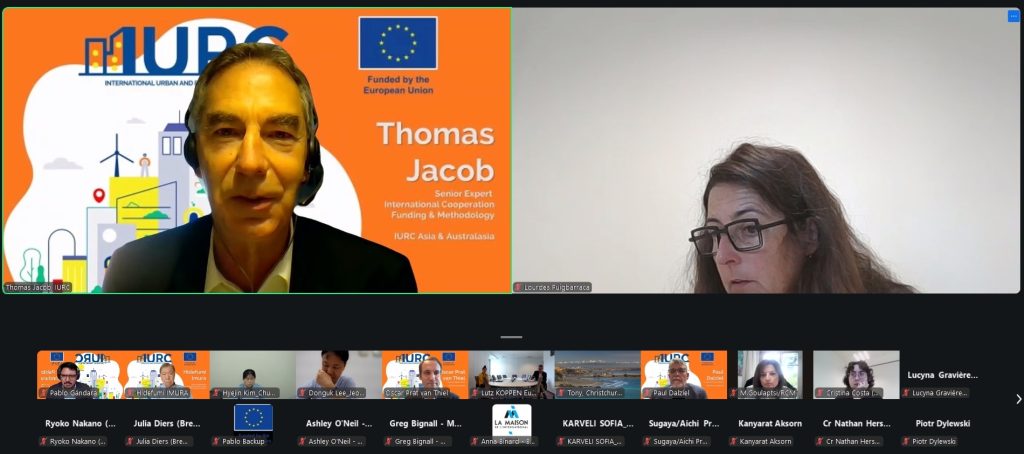
Towards a Common Hydrogen and Solar Agenda
The meeting transitioned into an interactive discussion on hydrogen and solar energy collaboration, exploring shared challenges such as integrating renewable sources into decentralised grids and managing energy transport and storage systems.
Ms. Gravière noted Auvergne-Rhône-Alpes’ progress in scaling hydrogen mobility infrastructure, while Prof. Imura pointed out the need for conceptual alignment—ensuring that regions using similar terminology on “green” and “clean” energy are truly aligned in practice. Participants agreed that defining common metrics and pilot objectiveswould help maximise the impact of cooperation.
Region-to-Region Innovation Cooperation Plan
In closing, Pablo Gándara introduced the Region-to-Region Innovation Cooperation Plan, the operational framework guiding IURC’s second phase. He invited regions to submit short pilot action proposals by February 2026, outlining their flagship initiatives, partnerships, and expected outcomes.
These proposals will be discussed within IURC’s four thematic clusters:
- Clean Energy
- Blue Economy
- Industrial Modernisation
- Agri-business
All participating regions will also have access to four flexible international event slots, enabling in-person exchanges, technical missions, and joint presentations at major forums—including the IURC Global Thematic Network Event in Barcelona (4–6 November 2025).
Looking Ahead
The strong participation across both continents demonstrated the collective drive to turn shared sustainability goals into tangible cooperation, leveraging innovation and partnership to build a more resilient, low-carbon future.
